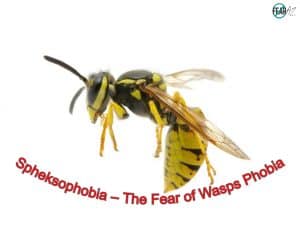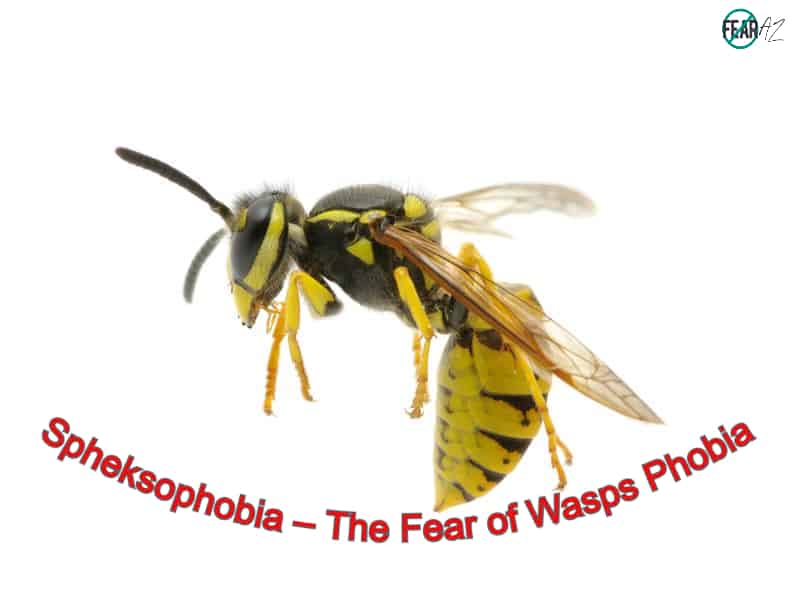Share This Article
Fear of Wasps Phobia Known As Spheksophobia
Do you get goosebumps whenever you see a flying wasp?
Do you run away the instant you see that distinctive yellow and black body?
Are you deathly scared of watching movies that have swarming or stinging insects?
Do you look at a wasp’s nest as if it were a ticking bomb?
Wasps make most people squirm in disgust. A lot of people are afraid of these insects because of their painful stings. But what if your terror is so extreme that the mere thought or image of a wasp can reduce you to tears?
You may have spheksophobia, an intense dread of wasps. Don’t lose hope. You’re not alone in having this problem. What’s more, you can overcome this phobia with the right information and support.

What Is Spheksophobia?
What is the phobia or fear of wasps? The word spheksophobia originates from the Greek language. Sphēks refers to “wasps” while phobos means “fear.” It’s similar to entomophobia, or the fear of insects.
Spheksophobia sufferers avoid gardens, parks, and similar locations. After all, wasps are likely to be found in places where flowers, trees, or bushes grow. Sometimes, those with this phobia are scared to even step out of their homes. They experience a range of symptoms including anxiety and panic attacks. In some cases the phobia is so severe that it interferes with daily life.
How Common Is Spheksophobia?
Is it normal to be terrified of wasps? It’s quite common since these insects are notorious for their painful and toxic stings. These insects are similar to bees but are larger and more aggressive. Wasps do not leave their stinger behind in human skin, so they can sting you multiple times. It’s difficult to protect yourself from this fast and ferocious insect. Some people have severe allergic reactions to wasp stings, which can be life-threatening.
Like most animals, wasps usually won’t bother you if you leave them alone. But if you happen to disturb them or their nest, they will sting you in self-defense. Keep in mind that wasps may also attack humans without any warning. You may not be aware that you’ve gotten too close to a nest. Sometimes, wasp attacks happen for no apparent reason.
What Causes Spheksophobia?
If you’ve experienced a wasp’s sting or you’ve seen someone get stung, you’re likely to develop a phobia of wasps. You may also develop this phobia after watching a nature documentary or reading a news article about wasps. Sometimes, parents might unknowingly pass on this phobia to their offspring. If you keep warning your children to be wary of wasps, they’re likely to be prone to phobia.
Spheksophobia Symptoms
People suffering from this fear of wasps are likely to suffer from these symptoms:
Physical Symptoms
- Freezing on the spot upon encountering a wasp
- Heart palpitations
- Heavy breathing
- High blood pressure
- Dizziness
- Nausea or vomiting
- Gastric problems
Mental/Emotional Symptoms
- Urge to run away
- Panic attacks
- Severe anxiety
- Nightmares about wasps
- Refusal to go outdoors or in areas with plant life
- Detachment from reality
- Frustration
- Aggression
- Irritation or short temper
Self-Help Techniques for Spheksophobia
Are you looking for a spheksophobia cure? It’s important to know that overcoming this phobia takes time. A phobia of wasps and bees can be handled well with self-help methods and support from your loved ones. No matter how tough, try to face your fears.
Before seeking help from professionals, consider helping yourself. It takes strength and determination to do so, but you have it in you. Incorporate changes in your lifestyle to help you deal with symptoms such as panic attacks. Aside from getting enough sleep and eating a healthy diet, consider these tips:
Regular Exercise
Phobia sufferers highly recommend exercises like cardio, aerobics, and yoga. Physical activity prompts the brain to release endorphins, which reduce phobia symptoms.
Less Caffeine
Consider reducing caffeine and other stimulants in your diet. Not only can caffeine make you feel jittery and hyperactive, but it can also makes your anxiety worse.
Relaxation Techniques
Learn how to control and relax your breathing. This way, you can soothe yourself when you start having a panic attack. A similar strategy is meditation, which allows you to calm your mind and manage anxiety.
Visualization Skills
Here, you will visualize yourself dealing with your phobia. Imagine you come across a wasp. What will your reaction be? Your imagination is powerful. In fact, it might even be the weapon you need to win your battle against your fears.
Support Groups
If you have trouble working alone, try joining a self-help group. This is another useful method for overcoming a phobia. All you need to do is seek out like-minded people and share your experiences with them. Some are ashamed of having this fear of wasps. They fear they will be laughed at, so they avoid talking about it. They choose to not open up. However, opening up about your fears can go a long way toward overcoming them. Also, it can be encouraging to know that you’re not the only person suffering from this phobia.
It’s important to know that all self-help methods require time and focus.
Professional Spheksophobia Treatment for the Fear of Wasps
It can be challenging to deal with this phobia if you can’t even step outside your home. If your symptoms are that severe, consult a medical professional who can properly diagnose your condition.
To help you successfully manage the symptoms of spheksophobia, you may undergo psychotherapy. For example, neurolinguistic programming can help you better manage your fight or flight response. Some experts recommend hypnosis. Here, a trained therapist will induce a deep state of relaxation. This therapy may help you discover the origins of your fear and deal with the stress caused by your phobia.
Other interventions include exposure therapy and cognitive behavioral therapy. As a last resort, a doctor may prescribe medication to alleviate extreme phobia symptoms. Keep in mind that pharmaceuticals may not always work. Not only that, but they may also have unpleasant side effects.
Learning to Cope with Spheksophobia
Keep in mind that self-help methods and professional intervention may not fully cure your phobia of wasps and bees. As with most phobias, there’s no guarantee that the fear and anxiety you experience will ever go away. But if you want to get a handle on your phobia, you need to face it head on. Simply ignoring it won’t make it magically disappear. Do something about it, otherwise, those tiny insects will continue to seriously limit your life choices. Eventually you’ll gain control over your responses and learn how to handle the situation better.
Conclusion
Truth be told, nobody likes creepy-crawlies. Don’t feel embarrassed about your fear of stinging insects. Take actions that can help you better cope with this condition. Even if you’re unable to completely cure your phobia, you’ll still have a full life. One day soon you’ll take a stroll in a flower-filled garden without batting an eye at flying insects.



